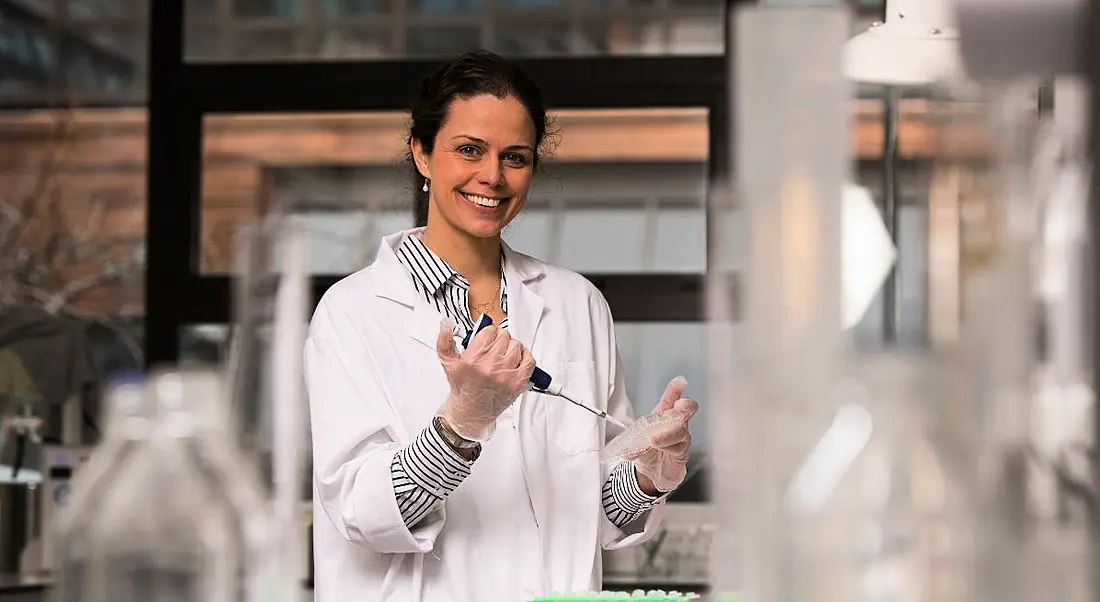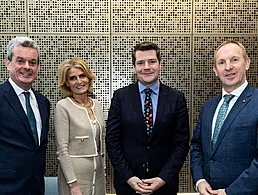Research is a broad discipline that encompasses a whole host of areas, and is instrumental in building our future. But what is it like actually working in research?
Dr Eibhlís M O’Connor, lecturer at University of Limerick (UL), gives us some in-depth insight into her research, and explains how she handles juggling multiple priorities.
What is your role within this company?
I am a principal investigator and lecturer in human nutrition in the Department of Biological Sciences, and a member of the Health Research Institute in the University of Limerick.
If there is such a thing, can you describe a typical day in the job?
Typical days don’t really exist in this job. It can vary so much that there is certainly no room for boredom.
Daily activities are very much dependent on the time of year. During term, it’s very much student and teaching focused. Daily activities include lecture prep, dealing with student queries, grading assignments, running tutorials, providing advice and training to final-year project students, and helping those students achieve their goals.
Out-of-term research takes priority. The research must still go on during term, though, so I could have research group meetings either on or off campus, be in contact with collaborators regarding grant applications or publications, or be reading the literature to see what the latest research knowledge in the scientific areas I work in is.
I need my daily dose of physical activity, so in the evenings I’m either running, playing tag rugby or swimming to keep me sane.
What types of project do you work on?
As a registered human nutritionist, my research focus is quite varied. This has been influenced largely by my doctoral research in the field of nutritional biochemistry, followed by a postdoctoral role in microbiology.
I have a number of different research collaborations, but a common thread among many of these projects is the functional role of a specific family of nutrient-dependent regulatory proteins and how they impact health. In addition, I have an interest in investigating the determinants of poor food choices in adolescents and improving dietary assessment methods using novel technologies. I am also interested in what factors influence malnutrition, especially among older adults.
The Daiichi Sankyo Research Award from the Irish Heart Foundation enables me to lead a multidisciplinary team investigating a novel, nutrient-dependent protein that regulates the progression of vascular calcification. Because measurements of various types of this protein also act as a cardiovascular disease risk and disease marker, they may also predict plaque composition and vulnerability, which are factors I am currently investigating.
This could be important from a therapeutic perspective. Identification of novel biomarkers of vascular calcification – such as these proteins – could potentially be used as a predictive tool to highlight those at greatest risk of cardiovascular events, stroke and adverse perioperative events. This could allow for tailored medical treatment approaches, streamlining patient care and improving patient outcomes.
My work with the Alimentary Pharmabiotic Centre in University College Cork (UCC) focuses on novel approaches to modify the gut microbiota – the collection of bacteria found in our gut – to impact health. I am involved in numerous studies that aim to alter the gut microbiota, using novel dietary approaches to improve health and wellbeing in specific patient cohorts and subgroups of the population.
This work is very exciting, as it links the actions of numerous systems and investigates how they are collectively responsible for regulating health. This work is primarily funded by the Irish Department of Agriculture, Food and the Marine (DAFM).
Because of demographic change, populations are ageing and living longer. There is an urgency to deal with the issues this presents to us – as societies, healthcare providers and families – in terms of how to best deal with the challenges presented by a larger-than-ever ageing population.
‘Science is fascinating, and it is exciting to be able to contribute to the current understanding on a range of research topics and to add to the existing knowledge base’
I am currently the national coordinator of a European initiative to investigate the determinants of malnutrition in the elderly. The Malnutrition in the Elderly (MaNuEL) knowledge hub aims to build research capacity in this crucial area by bringing together 21 experts from groups spanning seven countries to build a better understanding of the aetiology and prevalence of malnutrition in older persons, preferred screening tools and effective interventions in different healthcare settings.
Given the huge economic burden that malnutrition causes our elderly citizens and healthcare systems, it is important that both Ireland and Europe can provide insight and guidance to healthcare professionals and industry regarding the most efficient methods of determining malnutrition early. This will enable us to implement preventative strategies to reduce the burden of elderly malnutrition from a national and international perspective. The Irish partners (at UL, UCC and University College Dublin) are supported by the DAFM and the Health Research Board.
Finally, I am working with colleagues in the Department of Computer Science and in industry to develop a novel technological approach to determining dietary intake in younger populations.
Due to the huge societal burden that obesity is creating, and given the technological literacy of adolescents in particular, there is a real opportunity to create new solutions to understand dietary patterns and factors influencing dietary choice among younger generations. Equipped with this knowledge, this will enable us to decipher determinants of poor lifestyle choices in at-risk groups and empower us to develop effective strategies to deal with these issues.
What skills do you use on a daily basis?
Communication is key. It is vital to all of my work – with students in delivering lecture content, but also when interacting with research project partners and collaborators – to ensure targets and milestones are achieved and progress is made. If you cannot communicate clearly what you want from a project, and how to achieve that, you will face a tough challenge in meeting your goals.
As a result of dealing with people on a daily basis, good interpersonal skills are paramount to ensure communication is effective and everyone is clear on all objectives. This is especially important when trying to instil a passion in undergraduate students, and in dealing with postgraduate students who need sufficient mentoring and guidance to ensure they know what their role is within the greater context of what you do, and have the confidence to approach you if they are in difficulty.
Being organised is also vital, especially if you are dealing with large student numbers and numerous research project timelines. I am constantly populating my diary with reminders to ensure even the little things happen in a timely fashion. This is critical for good management, which is another vital skill for my job.
What is the hardest part of your working day?
It can be difficult to ensure you meet all of your daily targets, as often issues arise that need to be dealt with immediately. This can invariably disrupt the planned goals set out for that day.
Do you have any productivity tips that help you through the working day?
I find there are certain times of the day that are more productive than others. For example, the morning is a very good time for me as there tends to be fewer distractions. After 5pm can also be a good time, as there tends to be less activity.
When you first started this job, what were you most surprised to learn was important in the role?
Having confidence in your own ability and knowledge is paramount when lecturing. Drawing on your own research experience and passion for a topic really gives depth and substance to the subject content you are imparting to the student.
I also think it is important to make the topic relevant to the student, if possible, so they can see the value in the learning and how it can impact on them. When giving assignments, I try to keep the learning centred around what they are interested in from a research perspective.
How has this role changed as the sector has grown and evolved?
With regards to current thinking on teaching methods, there is now a big focus on technology and how it can aid effective learning. UL prides itself very much on being at the cutting edge of teaching methodology and, because of this, technology-enhanced learning is a huge focus.
Understandably there are different ways of learning, and students can be influenced by several different teaching approaches. In my role, I try to make use of novel teaching methods and aids to grab students’ attention and keep them interested in the subject content.
Because students are so technologically literate nowadays, they embrace novel methods and these can be very effective to enhance the learning environment for them. This is something that I am ever fascinated by and strive to improve year-on-year.
What do you enjoy most about the job?
From a research perspective, I really enjoy seeing the science evolve from a concept on a grant application to a real-life project that can impact people’s lives. Because I work on a variety of very different research topics, this ensures I never get bored, as each project is unique and has an impact on very different target populations.
Science is fascinating, and it is exciting to be able to contribute to the current understanding on a range of research topics and to add to the existing knowledge base.




